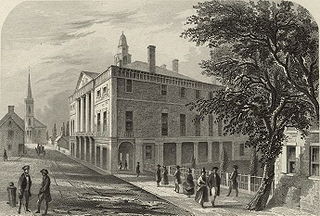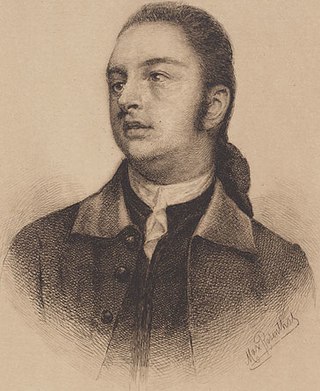
The 1st United States Congress, comprising the United States Senate and the United States House of Representatives, met from March 4, 1789, to March 4, 1791, during the first two years of George Washington's presidency, first at Federal Hall in New York City and later at Congress Hall in Philadelphia. With the initial meeting of the First Congress, the United States federal government officially began operations under the new frame of government established by the 1787 Constitution. The apportionment of seats in the House of Representatives was based on the provisions of Article I, Section 2, Clause 3, of the Constitution. Both chambers had a Pro-Administration majority. Twelve articles of amendment to the Constitution were passed by this Congress and sent to the states for ratification; the ten ratified as additions to the Constitution on December 15, 1791, are collectively known as the Bill of Rights, with an additional amendment ratified more than two centuries later to become the Twenty-seventh Amendment to the United States Constitution.

Peleg Arnold (1751–1820) was a lawyer, tavern-keeper, jurist, and statesman from Smithfield, Rhode Island. He represented Rhode Island as a delegate to the Continental Congress in the 1787–1788 session. He later served as the chief justice of the Rhode Island Supreme Court from June 1795 to June 1809, and from May 1810 to May 1812.

Benjamin Bourne was a United States representative from Rhode Island, a United States district judge of the United States District Court for the District of Rhode Island and a United States Circuit Judge of the United States Circuit Court for the First Circuit.
These are tables of congressional delegations from Rhode Island to the United States Senate and United States House of Representatives.

The 1792–93 United States House of Representatives elections were held on various dates in various states between August 27, 1792, and September 6, 1793. Each state set its own date for its elections to the House of Representatives before the first session of the 3rd United States Congress convened on December 2, 1793. With the addition of the new state of Kentucky's representatives, and the congressional reapportionment based on the 1790 United States census, the size of the House increased to 105 seats.

The 1790–91 United States House of Representatives elections were held on various dates in various states between April 27, 1790, and October 11, 1791. Each state set its own date for its elections to the House of Representatives before the first session of the 2nd United States Congress convened on October 24, 1791. This was the first midterm election cycle, which took place in the middle of President George Washington's first term. The size of the House increased to 67 seats after the new state of Vermont elected its first representatives.

The 1788–89 United States House of Representatives elections were the first U.S. House of Representatives elections following the adoption of the Constitution of the United States. Each state set its own date for its congressional elections, ranging from November 24, 1788, to March 5, 1789, before or after the first session of the 1st United States Congress convened on March 4, 1789. They coincided with the election of George Washington as the first president of the United States.
Job Durfee was a politician and jurist from Rhode Island. Born at Tiverton, he graduated from Brown University in 1813 and was admitted to the bar and commenced practice in Tiverton. He was a member of the Rhode Island House of Representatives from 1816 to 1820, and was elected as a Democratic-Republican to the Seventeenth Congress and was reelected as an Adams-Clay Republican to the Eighteenth Congress, serving from March 4, 1821 to March 3, 1825. He was an unsuccessful candidate for reelection in 1824 to the Nineteenth Congress and for election in 1828 to the Twenty-first Congress; he was again a member of the State house of representatives from 1826 to 1829, serving as speaker from 1827 to 1829. He declined to be a candidate for reelection and resumed the practice of law; in May 1833 he was elected associate justice of the Rhode Island Supreme Court. He was chief justice from June 1835 until his death in Tiverton in 1847. As chief justice, he presided over the trial of the last person executed in Rhode Island, John Gordon. Durfee's interment was in the family burying ground at Quaker Neck, near Tiverton.

Nathan Fellows Dixon was a United States senator from Rhode Island. Born in Plainfield, Connecticut, he attended Plainfield Academy and graduated from the College of Rhode Island and Providence Plantations at Providence in 1799. He studied law, was admitted to the bar in 1801 and commenced practice in New London County, Connecticut. He moved to Westerly, Rhode Island, in 1802 and continued the practice of law, and also engaged in banking, serving as president of the Washington bank of Westerly from 1829 until his death.
The Rhode Island at-large congressional district is currently obsolete, with representation divided into two districts.

Samuel Eddy was a U.S. Representative from Rhode Island. Born Johnston in the Colony of Rhode Island and Providence Plantations, Eddy completed preparatory studies. He graduated from Brown University in 1787. He studied law, was admitted to the bar in 1790 and practiced a short time in Providence. He served as clerk of the Rhode Island Supreme Court from 1790 to 1793. He also served as Rhode Island Secretary of State from 1798 to 1819.

Henry Marchant was a Founding Father of the United States, an attorney general of Rhode Island, a delegate to the Second Continental Congress from Rhode Island, a signer of the Articles of Confederation, and the first United States district judge of the United States District Court for the District of Rhode Island.

The 1790–91 United States Senate elections were held on various dates in various states. These U.S. Senate elections occurred during the first midterm election cycle, which took place in the middle of President George Washington's first term. As these elections were prior to the ratification of the Seventeenth Amendment in 1913, senators were chosen by state legislatures. Senators were elected over a wide range of time throughout 1790 and 1791, and a seat may have been filled months late or remained vacant due to legislative deadlock. In these elections, terms were up for the nine senators in Class 1.

The 1788–1789 United States Senate elections were the first U.S. Senate elections following the adoption of the Constitution of the United States. They coincided with the election of George Washington as the first president of the United States. As these elections were prior to the ratification of the Seventeenth Amendment in 1913, senators were chosen by state legislatures.

Rhode Island gained a second representative from the results of the 1790 census. Rhode Island did not divide itself into districts, but elected two at-large representatives.
The ratification of the United States Constitution by Rhode Island was the 1790 decision by the State of Rhode Island and Providence Plantations to accede to the United States Constitution. It was a controversial process which occurred only after the United States threatened a trade embargo against Rhode Island for non-compliance.

The 2018 United States House of Representatives elections in Rhode Island were held on November 6, 2018, to elect the two U.S. representatives from the state of Rhode Island, one from each of the state's 2 congressional districts. The election coincided with the 2018 U.S. mid-term elections, as well as other elections to the House of Representatives, elections to the United States Senate and various state and local elections. The primaries took place on September 12.

Rhode Island held its late election for the First Congress on August 31, 1790, due to the late ratification of the Constitution, just about a month and a half before the October 18, 1790 election for the Second Congress.

The 2020 United States House of Representatives elections in Rhode Island was held on November 3, 2020 to elect the two U.S. representatives from the state of Rhode Island, one from each of the state's 2 congressional districts. The elections will coincide with the 2020 U.S. presidential election, as well as other elections to the House of Representatives, elections to the United States Senate and various state and local elections.














